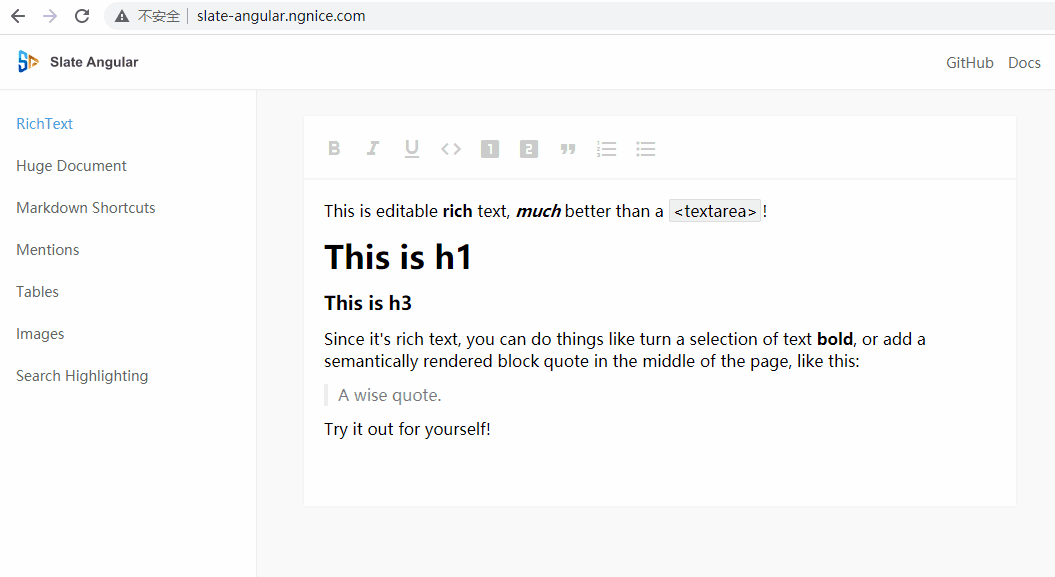基于 Slate 的 Angular 视图层
Slate 是一款架构良好、高扩展性的富文本编辑器框架,包括核心模型和视图层,但 slate 官方只提供了基于 react 的视图层,slate-angular 是 slate 视图层实现的补充,可帮助您使用 slate 和 angular 构建富文本编辑器。
slate-angular 以 slate-react 为灵感,并且尽量保持 slate 和 angular 各自的风格, 对中文输入友好, 开启你的 slate-angular 之旅吧。
- 支持 Element 前后光标方案
- 支持自定义组件/模版渲染 Element
- 支持自定义组件/模版渲染 Text
- 支持自定义组件/模版渲染 Leaf
- 支持 decorate 装饰
- 支持 void 元素
Chrome、Edge、Safari、Firefox、QQ Browser
"dependencies": {
"direction": "^2.0.1",
"is-hotkey": "^0.2.0",
"slate": "~0.101.5",
"slate-history": "~0.100.0",
"slate-angular": "~16.1.0-next.8"
}
import { FormsModule } from '@angular/forms';
import { SlateModule } from 'slate-angular';
@NgModule({
imports: [
// ...,
FormsModule,
SlateModule
],
// ...
})
export class AppModule { }
src/styles.scss
@use 'slate-angular/styles/index.scss';
// basic richtext styles
.slate-editable-container {
[slate-underlined][slate-strike] {
text-decoration: underline line-through;
}
[slate-strike] {
text-decoration: line-through;
}
[slate-underlined] {
text-decoration: underline;
}
[slate-italic] {
font-style: italic;
}
[slate-bold] {
font-weight: bold;
}
[slate-code-line] {
margin: 0 4px;
padding: 2px 3px;
border: 1px solid rgba($color: #000000, $alpha: 0.08);
border-radius: 2px;
background-color: rgba($color: #000000, $alpha: 0.06);
}
blockquote {
margin: 0;
margin-left: 0;
margin-right: 0;
color: #888;
padding-left: 10px !important;
border-left: 4px solid #eee;
}
h1,h2,h3 {
margin: 0px;
}
&>[data-slate-node="element"],&>slate-block-card {
margin-bottom: 12px;
}
}
// basic richtext container styles
.demo-richtext-container {
max-width: 42em;
margin: 50px auto;
background-color: #fff;
box-shadow: 0px 0px 4px rgba(0, 0, 0, 0.2);
}
import { ChangeDetectorRef, Component, ElementRef, Renderer2 } from "@angular/core";
import { BaseTextComponent } from "slate-angular";
export enum MarkTypes {
bold = 'bold',
italic = 'italic',
underline = 'underlined',
strike = 'strike',
code = 'code-line'
}
@Component({
selector: 'span[textMark]',
template: ``,
host: {
'data-slate-node': 'text'
}
})
export class DemoTextMarkComponent extends BaseTextComponent {
attributes: string[] = [];
constructor(public renderer2: Renderer2) {
super();
}
applyTextMark() {
this.attributes.forEach(attr => {
this.renderer2.removeAttribute(this.elementRef.nativeElement, attr);
});
this.attributes = [];
for (const key in this.text) {
if (Object.prototype.hasOwnProperty.call(this.text, key) && key !== 'text') {
const attr = `slate-${key}`;
this.renderer2.setAttribute(this.elementRef.nativeElement, attr, 'true');
this.attributes.push(attr);
}
}
}
onContextChange() {
super.onContextChange();
this.applyTextMark();
}
}
Template
<div class="demo-richtext-container">
<slate-editable [editor]="editor" [(ngModel)]="value"
(ngModelChange)="valueChange($event)"
[renderElement]="renderElement"
[renderText]="renderText">
<ng-template #heading_1 let-context="context" let-viewContext="viewContext">
<h1 slateElement [context]="context" [viewContext]="viewContext"></h1>
</ng-template>
<ng-template #heading_2 let-context="context" let-viewContext="viewContext">
<h2 slateElement [context]="context" [viewContext]="viewContext"></h2>
</ng-template>
<ng-template #heading_3 let-context="context" let-viewContext="viewContext">
<h3 slateElement [context]="context" [viewContext]="viewContext"></h3>
</ng-template>
<ng-template #blockquote let-context="context" let-viewContext="viewContext">
<blockquote slateElement [context]="context" [viewContext]="viewContext"></blockquote>
</ng-template>
<ng-template #ul let-context="context" let-viewContext="viewContext">
<ul slateElement [context]="context" [viewContext]="viewContext"></ul>
</ng-template>
<ng-template #ol let-context="context" let-viewContext="viewContext">
<ol slateElement [context]="context" [viewContext]="viewContext"></ol>
</ng-template>
<ng-template #li let-context="context" let-viewContext="viewContext">
<li slateElement [context]="context" [viewContext]="viewContext"></li>
</ng-template>
</slate-editable>
</div>
TS
import { Component, ViewChild, TemplateRef } from '@angular/core';
import { createEditor, Element } from 'slate';
import { withHistory } from 'slate-history';
import { withAngular } from 'slate-angular';
import { DemoTextMarkComponent, MarkTypes } from './text-mark.component';
@Component({
selector: 'app-root',
templateUrl: './app.component.html',
styleUrls: ['./app.component.scss']
})
export class AppComponent {
title = 'slate-angular-basic';
value = initialValue;
@ViewChild('heading_1', { read: TemplateRef, static: true })
headingOneTemplate!: TemplateRef<any>;
@ViewChild('heading_2', { read: TemplateRef, static: true })
headingTwoTemplate!: TemplateRef<any>;
@ViewChild('heading_3', { read: TemplateRef, static: true })
headingThreeTemplate!: TemplateRef<any>;
@ViewChild('blockquote', { read: TemplateRef, static: true })
blockquoteTemplate!: TemplateRef<any>;
@ViewChild('ul', { read: TemplateRef, static: true })
ulTemplate!: TemplateRef<any>;
@ViewChild('ol', { read: TemplateRef, static: true })
olTemplate!: TemplateRef<any>;
@ViewChild('li', { read: TemplateRef, static: true })
liTemplate!: TemplateRef<any>;
editor = withHistory(withAngular(createEditor()));
ngOnInit(): void {
}
valueChange(value: Element[]) {
}
renderElement = (element: any) => {
if (element.type === 'heading-one') {
return this.headingOneTemplate;
}
if (element.type === 'heading-two') {
return this.headingTwoTemplate;
}
if (element.type === 'heading-three') {
return this.headingThreeTemplate;
}
if (element.type === 'block-quote') {
return this.blockquoteTemplate;
}
if (element.type === 'numbered-list') {
return this.olTemplate;
}
if (element.type === 'bulleted-list') {
return this.ulTemplate;
}
if (element.type === 'list-item') {
return this.liTemplate;
}
return null;
}
renderText = (text: any) => {
if (text[MarkTypes.bold] || text[MarkTypes.italic] || text[MarkTypes.code] || text[MarkTypes.underline]) {
return DemoTextMarkComponent;
}
return null;
}
}
const initialValue = [
{
type: 'paragraph',
children: [
{ text: 'This is editable ' },
{ text: 'rich', bold: true },
{ text: ' text, ' },
{ text: 'much', bold: true, italic: true },
{ text: ' better than a ' },
{ text: '<textarea>', 'code-line': true },
{ text: '!' }
]
},
{
type: 'heading-one',
children: [{ text: 'This is h1 ' }]
},
{
type: 'heading-three',
children: [{ text: 'This is h3 ' }]
},
{
type: 'paragraph',
children: [
{
text: `Since it's rich text, you can do things like turn a selection of text `
},
{ text: 'bold', bold: true },
{
text: ', or add a semantically rendered block quote in the middle of the page, like this:'
}
]
},
{
type: 'block-quote',
children: [{ text: 'A wise quote.' }]
},
{
type: 'paragraph',
children: [{ text: 'Try it out for yourself!' }]
},
{
type: 'paragraph',
children: [{ text: '' }]
}
];
记得在 NgModule 中声明刚刚创建的 DemoTextMarkComponent 组件
基础使用成功界面
现在基础使用中还没有实现工具栏,你可以根据你自己的需要引入图标库或者组件库实现工具栏.
基础使用代码仓储: https://github.com/pubuzhixing8/slate-angular-basic
|
PingCode Wiki |
npm install // 安装所有依赖npm run start // 启动 demo
npm run build // 重新构建 slate-angular
npm run test // 执行单元测试Angular >= 10.2.4
Slate >= 0.63.0
欢迎 🌟 Stars 和 📥 Pull requests!




